These DIY disinfecting wipes make it easy to keep your home clean without toxic chemicals. They’re easy to make, natural, and reusable — just wash and re-use! Our homemade cleaning wipes are made without vinegar, so they’re safe for use even on porous surfaces like marble and granite. Read on to learn how to make your own disinfecting wipes with essential oils.
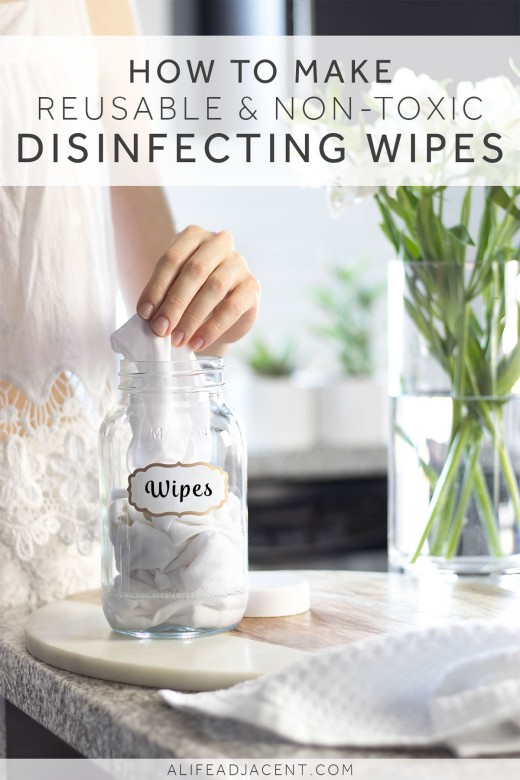
While store-bought disinfecting wipes may be handy for quick cleanups, they’re definitely not eco-friendly or good for your respiratory health.
It’s safer to make DIY disinfecting wipes for light clean-ups using non-toxic ingredients such as vodka, castile soap and antibacterial essential oils.
Numerous studies have shown that common household cleaning products, including store-brand sanitizing wipes, can actually induce asthma or other respiratory problems in otherwise healthy individuals.
Additionally, the fumes from many store bought cleaning products can trigger an attack in those already suffering from a respiratory condition.
Undisclosed ingredients in commercial disinfecting wipes
To add to the confusion, manufacturers are allowed to keep consumers in the dark about exactly what’s in their cleaning products. Unfortunately, current guidelines do not require that ingredient information be disclosed on the product’s label.
Recently, more and more cleaning product companies have begun to provide some ingredient information on their company websites. However, often these lists are not specific.
The Environmental Working Group site is a go-to for the ingredient lists manufacturers are allowed to leave off their labels. The EWG also provides consumers additional info — such as the side effects and potential toxicity of each ingredient.
Here is a handy list of many popular commercial wipe brands and their ingredients.
Anyway, if reading about the toxic chemicals in cleaning products comes across as fear-mongering, or if you’re thinking, “but how are these homemade wipes going to disinfect my counters?” Well, studies have shown that many essential oils do have antibacterial, anti-fungal and antiviral benefits.
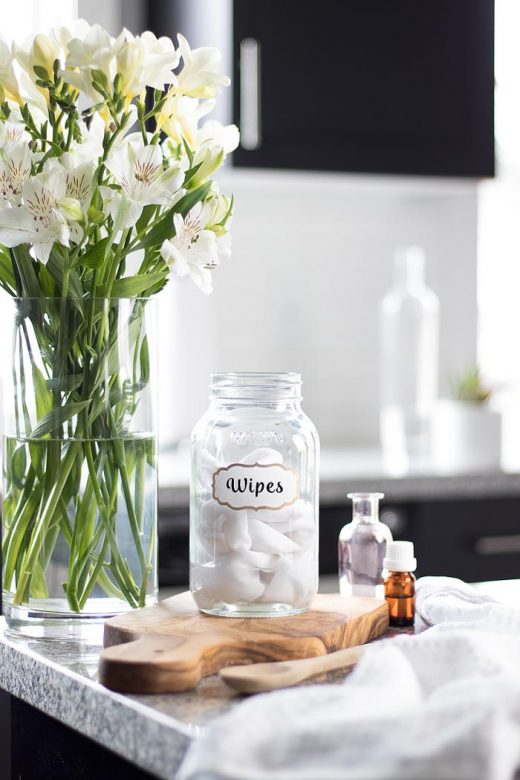
Top antibacterial essential oils for homemade cleaning wipes
The following essential oils (in no particular order) fight bacteria and household odours without any of the negative side effects of store bought household cleaners.
It’s important to note that essential oils are only a supplement to the disinfecting properties of the alcohol.
You can make disinfecting wipes with essential oils as long as your wipes recipe also contains effective disinfectants such as high-proof vodka (or rubbing alcohol). Please do not rely on essential oils as your sole disinfectant, especially during an active virus outbreak.
Additionally, you can also substitute the essential oils included in the recipe below for any other combination of oils from this list.
Antibacterial essential oils include:
- Eucalyptus
- Lemongrass
- Tea Tree Oil
- Grapefruit
- Palmarosa
- Cinnamon
- Rosemary
- Bergamot
- Orange
- Clove
- Oregano
- Thyme
- Basil
- Lavender
- Peppermint
Surprisingly, numerous studies have shown that cinnamon is actually the best performing antibacterial essential oil.
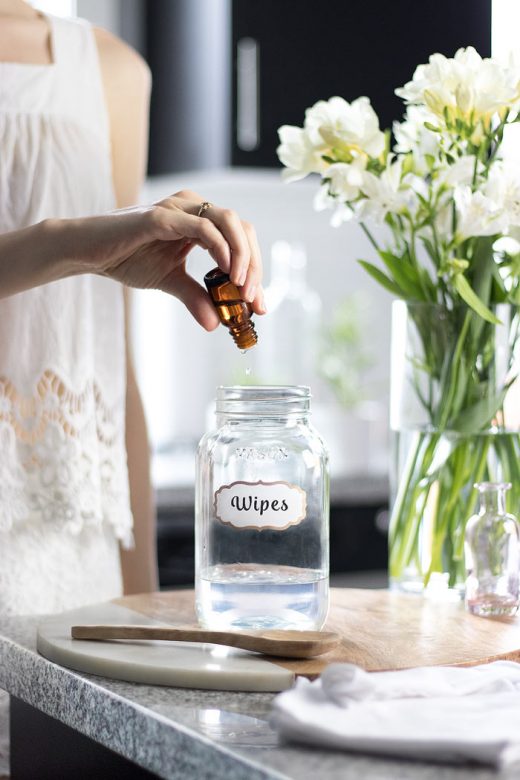
Ingredients for DIY disinfecting wipes
I always use high-proof vodka in my homemade disinfecting wipes which is a more natural disinfectant. Vodka also acts as a non-toxic preservative which prevents the growth of mold and pathogens.
However, the alcohol content of the brand of vodka you use for this recipe is very important.
The brand must be at least 70% alcohol, as this is the minimum required percentage needed for killing a broad range of bacteria and viruses while cleaning. This includes bacteria such as E. coli and lipophilic viruses such as influenza.
Vodka brands that meet the guidelines for high alcohol content include:
- Everclear – 95% alcohol or 190 proof
- Spirytus Rektyfikowany – 96% alcohol or 192 proof
- Devil Springs Vodka – 80% alcohol or 160 proof
- Good ol’ Sailor Vodka – 85% vodka or 175 proof
- Balkan 176 – 88% alcohol or 176 proof
- Pincer Vodka – 88% alcohol or 176 proof
If desired, you can substitute the vodka in this recipe for isopropyl alcohol (or rubbing alcohol). However, keep in mind that Isopropyl alcohol is highly flammable, easily absorbed through the skin, and its fumes can cause dizziness and migraine headaches in some people.
Also, isopropyl or rubbing alcohol is highly toxic if consumed, while vodka (or ethyl alcohol) is safe for human consumption.
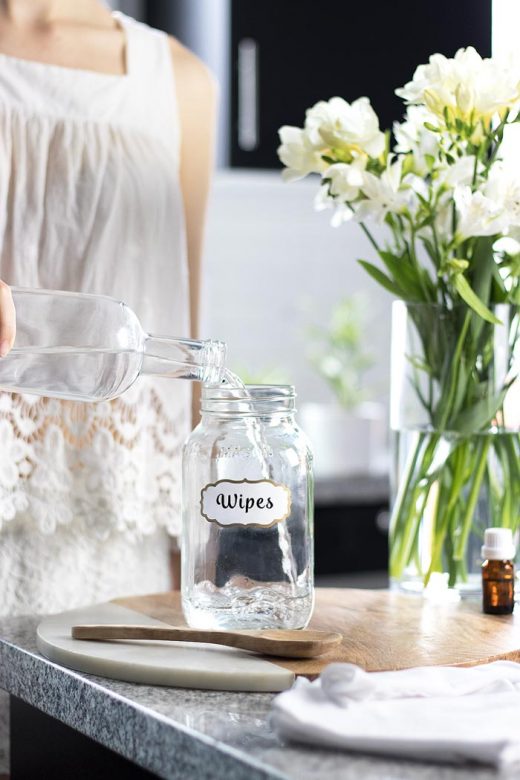
Not that you will be drinking your wipe mixture, but if you’re going to wipe down surfaces where little mouths will be, it’s safer to use vodka.
In addition to vodka, these disinfecting wipes also contain castile soap as a mild cleansing agent. You can also use soap nut concentrate, or make your own soap nut liquid from scratch.
Note: I’ve recently seen DIY cleaning wipes recipes containing both vinegar and castile soap, but mixing vinegar with castile soap will cause your mixture to curdle. As well, the acidic vinegar and alkaline soap will neutralize one another, rendering their cleaning abilities useless.
Additionally, vinegar is not safe for stone countertops. So, if you have stone countertops, be wary of any DIY cleaning wipes recipes that contain vinegar. That said, vinegar is still a great natural cleaner and it is safe for many household surfaces.
Save money on cleaning wipes with reusable cloths
You can also save money by making these DIY disinfecting wipes, as the t-shirt squares (or cloths) used in this recipe can be washed and then reused in a subsequent batch. This also means that these wipes are compatible with an eco-friendly, low-waste lifestyle.
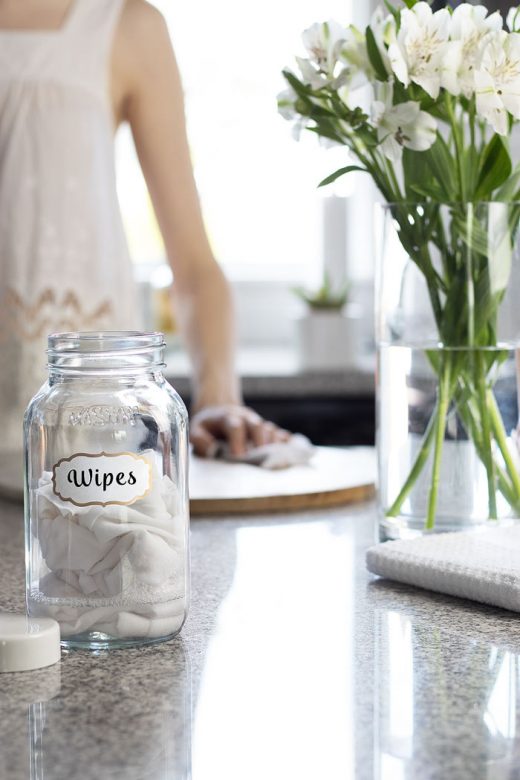
If you don’t have any old t-shirts on hand or if you would prefer a thicker cloth, there are also many varieties of reusable cloths available depending on your preference.
Heavy-duty microfibre cloths, cotton wipes and biodegradable bamboo cloths are just some of the choices available.
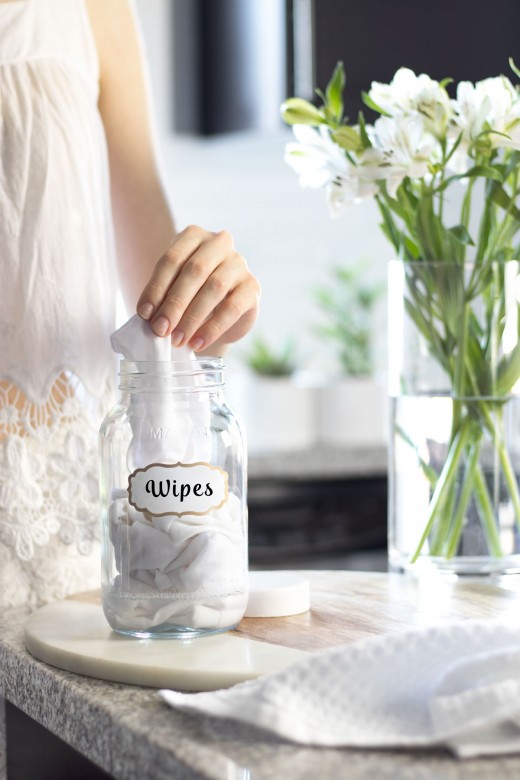
How to use these sanitizing wipes
Before using your wipes, thoroughly clean and scrub the area of any food particles, grease or grime, using a combination of soap and water. Any dirt or debris left on your surface will affect the disinfecting capabilities of your wipes so this is an important step.
You can keep these wipes in your bathroom or kitchen cupboard for quick, light cleanups of household surfaces prone to germs. If convenience is a plus for you, these DIY disinfecting wipes can also be used on the go, and you can trust them to be free of harsh antibacterial agents like triclosan.
These wipes are also safe enough to be used on hands, but be sure to use essential oils that are safer for skin such as peppermint, lavender, tea tree and eucalyptus, and don’t touch your face or eyes after use.
Although, it should be noted that soap and hot water is preferable for cleaning your hands. However, these wipes are better than nothing when you’re not near a sink.
DISCLAIMER: These cleaning wipes have not been lab-tested to determine their efficiency against viruses so please do not use them for this purpose. Any product used to deal with viruses must include at least 70% alcohol content as recommended by the CDC and other health organizations.
DIY Disinfecting Wipes (Natural & Reusable)
What You’ll Need
Ingredients
- 1 cup high proof vodka
- 2 1/2 – 3 tablespoons castile soap
- 20 drops lemongrass essential oil
- 10 drops tea tree essential oil
- 10 drops eucalyptus essential oil
Supplies
- Mason jar with lid or a sterilized pickle jar
- Old white t-shirt cut into squares (or microfibre or other inexpensive cotton cloths)
- Waterproof adhesive label
Instructions
- Pour the vodka into your sterilized mason jar.
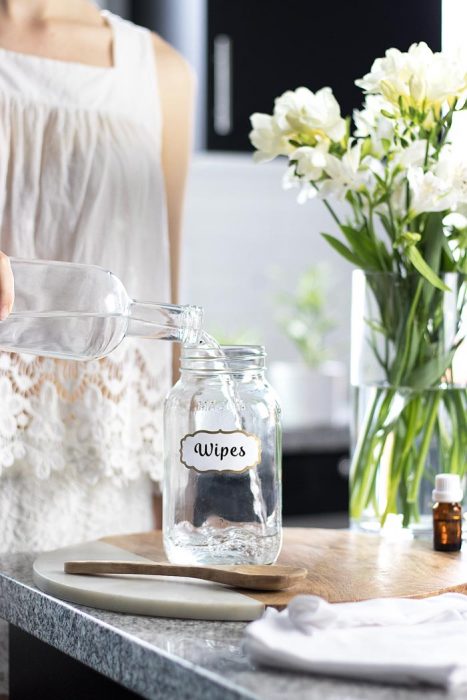
- Add the essential oils which will combine easily with the alcohol. Shake vigorously to combine.
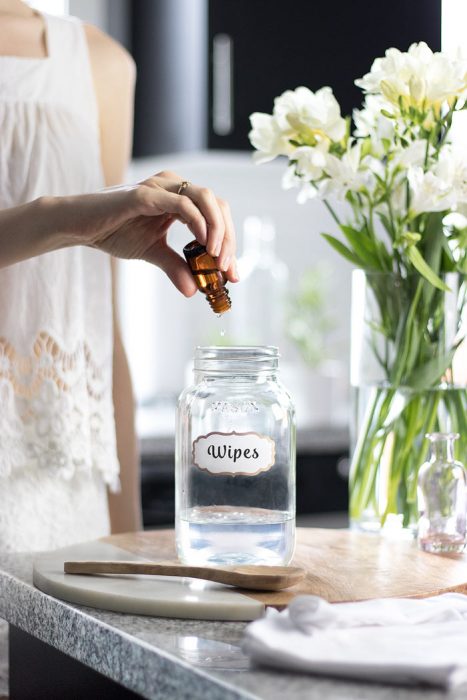
- Add your soap and then gently swirl it into the mixture. Please note, shaking will cause the castile soap to sud.
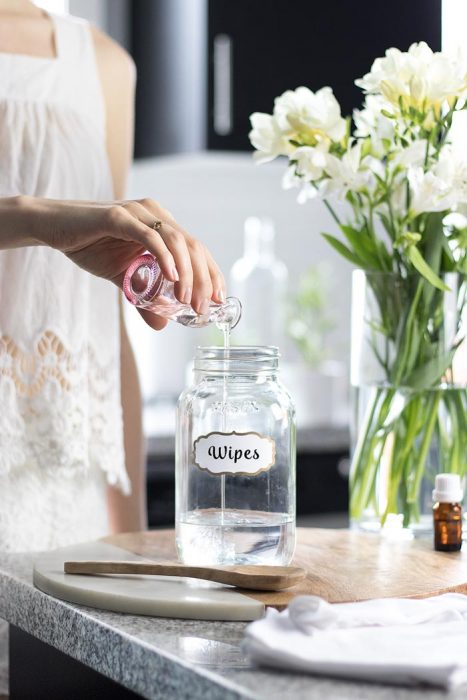
- Roll your cloths as shown in the photo and place them in the mason jar.
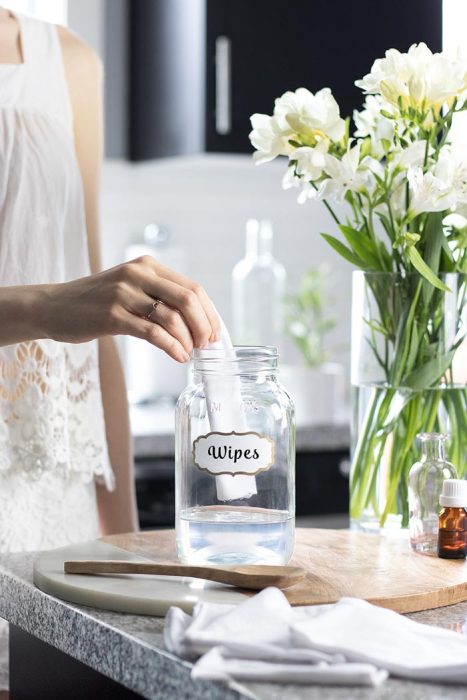
- Replace the lid and again swirl gently so the cloths become soaked with the liquid.
- Store your sanitizing wipes with the lid tightly secured in a cool, dark place such as under the kitchen or bathroom sink.
Notes
We do not recommend storing products with high concentrations of essential oils in plastic bottles or containers. We use glass storage containers for all of our DIY products with essential oils, as essential oils are extremely potent and can leach toxins from plastic containers.
Please consult with your health care provider about using essential oils, especially if you’re pregnant or breastfeeding, have allergies, or have small children in your home. Certain essential oils such as rosemary, clove and eucalyptus are contradicted for use during pregnancy. As well, certain essential oils such as rosemary, peppermint, oregano and eucalyptus should be avoided, or used with caution around children under 10.
More DIY cleaning recipes
Looking for more eco-friendly cleaning and home ideas? Check these out:
- DIY Rose Petal-Infused Vodka Cleaning Spray
- Refreshing Cola Diffuser Recipe
- DIY Lavender Lemon Glass Cleaner without Rubbing Alcohol
- DIY Vodka Room Sprays with Essential Oils
For even more natural cleaning ideas, follow us on Pinterest! You can also find us on Instagram, Facebook, and Twitter.
Pin it for later
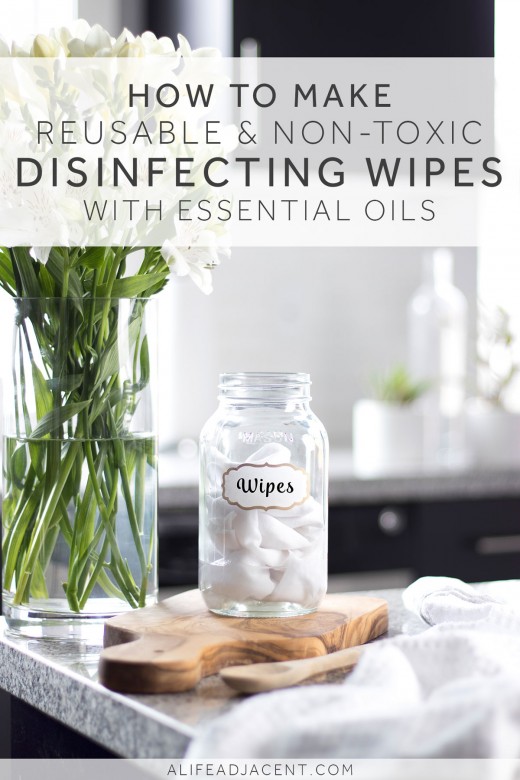

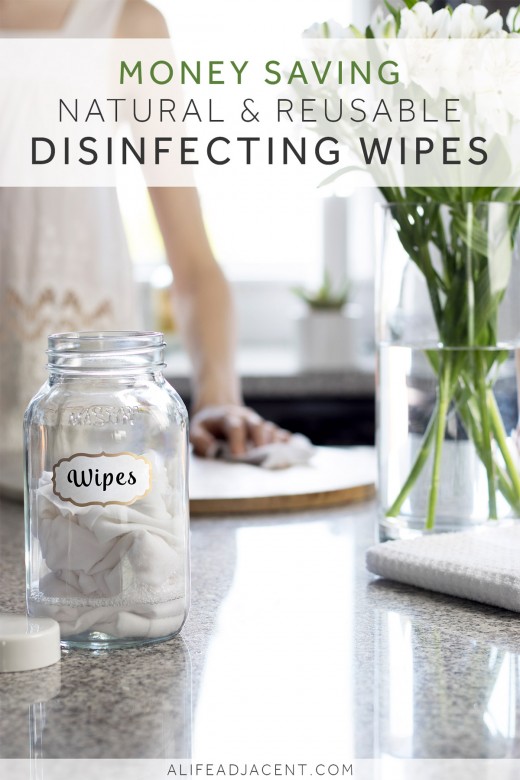
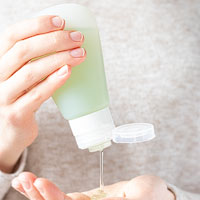
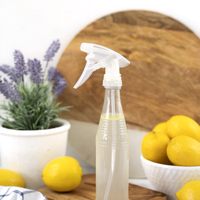
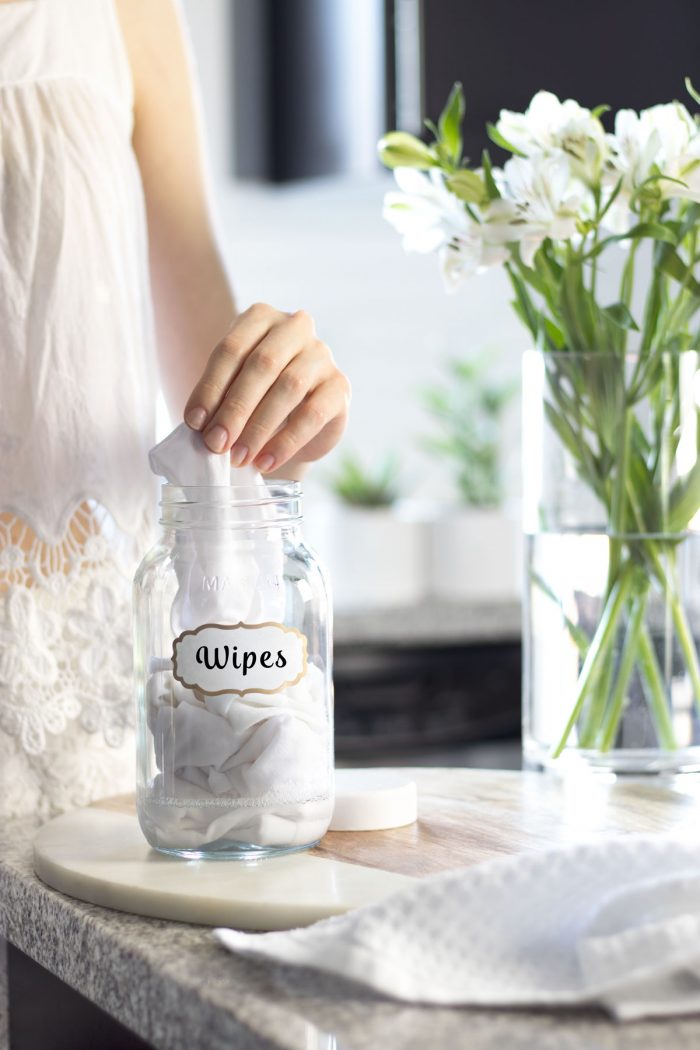
Jackie
Wednesday 12th of July 2023
Omg I am wanting to make some of these so bad! I would love to use these for cleaning. We are having our carpets cleaned this week but making these would take my cleaning game to the next level haha. Thanks for sharing!!!
jackie
Tuesday 11th of July 2023
Omg I am wanting to make some of these so bad! I would love to use these for cleaning. We are having our carpets cleaned this week but making these would take my cleaning game to the next level haha. Thanks for sharing!!!
Kim
Tuesday 11th of July 2023
You're very welcome, Jackie! We hope you enjoy the recipe and we hope your carpet cleaning goes well!
Chantelle
Wednesday 8th of June 2022
I stored these in a mason jar, now the white part on the inside of the mason jar lid is all cracked up and turned greeny-blue. Does alcohol do something to the mason jar lid?
Chantelle
Friday 10th of June 2022
@Kim, Thank you so much for your response!! I will try replacing the lid and see what happens. Thanks again!
Kim
Thursday 9th of June 2022
Hi Chantelle, we haven't experienced that issue but maybe the essential oils got on your lid? They can damage the plastic overtime if they're in direct contact but as long as they're not directly touching the lid, we haven't had a problem with cracking or discoloration. Plus, essential oil bottles also have plastic lids. Maybe just try replacing your lid and try not to get any liquid from the wipes on it. Hope that helps because I'm not exactly sure what happened as we also use essential oil sprays with alcohol that haven't damaged our plastic nozzles.
Layton
Monday 28th of December 2020
I love these and they smell amazing. Thank you.
Kyla
Tuesday 29th of December 2020
We're so happy you like them too, Layton! Thank you for commenting. 😊
Alisha
Friday 6th of March 2020
If I do not wish to have any type of high proof alcohol in my home, is there a possible substitute for the vodka?
Lorri
Monday 27th of July 2020
@Alisha, Results taken from the website https://www.ncbi.nlm.nih.gov/pmc/articles/PMC5074231/
The initial hand imprint plates for MRSA and VRE showed confluent growth. After disinfection with alcohol, activated hydrogen peroxide and 3.1% hydrogen peroxide, there was no growth seen on any of the post spray hand imprint plates.
The initial agar plates for the finger imprint cultures for C. difficile showed between 9 and 438 colonies. Alcohol spray had a statistically non-significant reduction in the growth of C. difficile on the post hand imprint agar plates (average p = 0.66). However, activated hydrogen peroxide and 3.1% hydrogen peroxide significantly reduced and eliminated transmission of C. difficile respectively (P < 0.05)
I think peroxide would be a good choice for spraying as a disinfectant.
Kim
Saturday 7th of March 2020
Hi Alisha, Since the vodka is important for disinfecting, I don't know what else to suggest. I know some people substitute rubbing alcohol for the vodka but since the fumes of rubbing alcohol trigger a migraine for me, I don't use it. Sorry I can't be of more help!